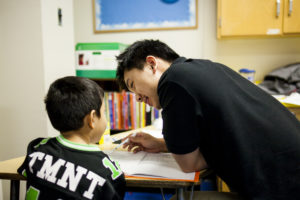It is no secret that the Covid-19 pandemic has dramatically impacted learning, compelling school closures and forcing a quick re-routing to online learning. Students from low income households and students of color, in particular, have faced the greatest barriers to success during virtual learning.
This means more students are falling further behind, creating ramifications that threaten their academic trajectories. Without serious intervention, the consequences of COVID learning loss could last a lifetime, setting students back academically in a way that will affect their ability to be successful in school and professionally. According to a McKinsey study, students were an average of 1.5 months further behind in reading than they would have been if not for COVID. Students of color are scoring at only 77% of their annual reading average, losing essentially a quarter of the academic year’s worth of learning.
Fortunately, there are ways to remedy these losses, including tutoring, and The Literacy Lab is at the forefront of these efforts. According to the McKinsey report:
“Broader research on tutoring finds that it has the greatest impact on reading abilities in the early years (especially in kindergarten and first grade) but more impact in math performance in later grades. Tutoring conducted during school hours is more effective than tutoring after school, and tutoring using teachers or paraprofessionals is more effective than that using volunteers or parents.”

This research is backed by a study from the Abell Foundation, which identified several key elements of effective literacy tutoring, including:
- Using a phonetic approach that emphasizes phonemic awareness, phonics, comprehension, fluency, and vocabulary
- Utilizing “paid volunteers” (i.e., AmeriCorps members paid a living stipend for working full-time
- Providing services during the instructional day
- Professional development and in-service training, plus ongoing monitoring and coaching
- Tutors maintain close contact with classroom teachers, to discuss progress of students, and also collaborate closely with supervisors and other tutors
This suite of best practices represent the model The Literacy Lab has long used to help struggling students excel as readers, but now our work is more important than ever, and the template we use is exactly what is needed to help students rebound from COVID learning loss.